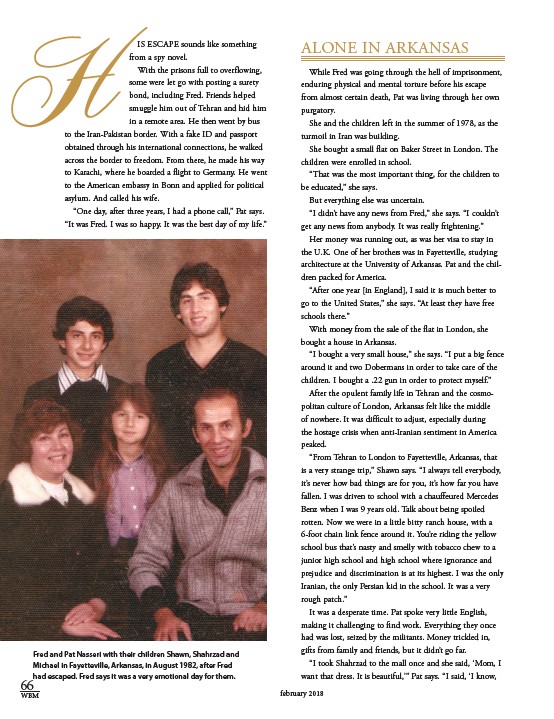
IS ESCAPE sounds like something
from a spy novel.
With the prisons full to overflowing,
some were let go with posting a surety
bond, including Fred. Friends helped
smuggle him out of Tehran and hid him
in a remote area. He then went by bus
to the Iran-Pakistan border. With a fake ID and passport
obtained through his international connections, he walked
across the border to freedom. From there, he made his way
to Karachi, where he boarded a flight to Germany. He went
to the American embassy in Bonn and applied for political
asylum. And called his wife.
“One day, after three years, I had a phone call,” Pat says.
“It was Fred. I was so happy. It was the best day of my life.”
ALONE IN ARKANSAS
While Fred was going through the hell of imprisonment,
enduring physical and mental torture before his escape
from almost certain death, Pat was living through her own
purgatory.
She and the children left in the summer of 1978, as the
turmoil in Iran was building.
She bought a small flat on Baker Street in London. The
children were enrolled in school.
“That was the most important thing, for the children to
be educated,” she says.
But everything else was uncertain.
“I didn’t have any news from Fred,” she says. “I couldn’t
get any news from anybody. It was really frightening.”
Her money was running out, as was her visa to stay in
the U.K. One of her brothers was in Fayetteville, studying
architecture at the University of Arkansas. Pat and the chil-dren
packed for America.
“After one year in England, I said it is much better to
go to the United States,” she says. “At least they have free
schools there.”
With money from the sale of the flat in London, she
bought a house in Arkansas.
“I bought a very small house,” she says. “I put a big fence
around it and two Dobermans in order to take care of the
children. I bought a .22 gun in order to protect myself.”
After the opulent family life in Tehran and the cosmo-politan
66
WBM february 2018
culture of London, Arkansas felt like the middle
of nowhere. It was difficult to adjust, especially during
the hostage crisis when anti-Iranian sentiment in America
peaked.
“From Tehran to London to Fayetteville, Arkansas, that
is a very strange trip,” Shawn says. “I always tell everybody,
it’s never how bad things are for you, it’s how far you have
fallen. I was driven to school with a chauffeured Mercedes
Benz when I was 9 years old. Talk about being spoiled
rotten. Now we were in a little bitty ranch house, with a
6-foot chain link fence around it. You’re riding the yellow
school bus that’s nasty and smelly with tobacco chew to a
junior high school and high school where ignorance and
prejudice and discrimination is at its highest. I was the only
Iranian, the only Persian kid in the school. It was a very
rough patch.”
It was a desperate time. Pat spoke very little English,
making it challenging to find work. Everything they once
had was lost, seized by the militants. Money trickled in,
gifts from family and friends, but it didn’t go far.
“I took Shahrzad to the mall once and she said, ‘Mom, I
want that dress. It is beautiful,’” Pat says. “I said, ‘I know,
H
Fred and Pat Nasseri with their children Shawn, Shahrzad and
Michael in Fayetteville, Arkansas, in August 1982, after Fred
had escaped. Fred says it was a very emotional day for them.